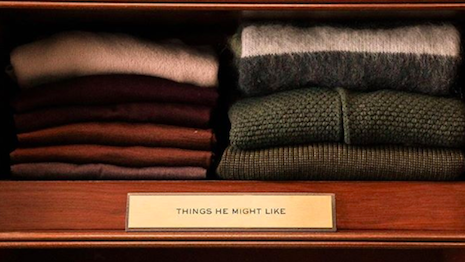- About
- Subscribe Now
- New York,
June 28, 2019

 The Mr Porter Style Assistant suggests tailored gift ideas. Image credit: Mr Porter
The Mr Porter Style Assistant suggests tailored gift ideas. Image credit: Mr Porter
As brands and retailers continue to invest in artificial intelligence and other automated services to enhance customer experiences, the majority of consumers feel frustrated when they cannot opt for human interactions.
Only 16 percent of consumers enjoy automated communications with brands, per a new report from Invoca. This underscores that there is no one-size-fits-all strategy for providing effective customer service, especially as omnichannel consumer spending rises.
“Over half of consumers feel frustrated by automated interactions with brands – people just aren’t happy with, or ready yet, to have important interactions with chatbots or AI-powered applications,” said Julia Stead, vice president of marketing at Invoca, Santa Barbara, CA. “This highlights the importance of offering consumers a way to have a conversation with your brand – whether that’s in person, on the phone or via messaging – is vital to providing a good customer experience.”
Invoca’s report is based on a survey of 2,000 U.S. adults from Invoca and The Harris Poll.
AI-powered advice
Fifty-two percent of consumers feel frustrated when facing digital communications, such as chatbots, without an option for live customer service, while 18 percent feel angry.
When completing retail transactions, 46 percent prefer doing so in-person while 35 percent prefer online. Only 5 percent favor completing retail purchases over the phone.
Retail shoppers prefer in-person assistance versus online or over the phone. Image credit: Valextra
Online is preferred by 55 percent consumers who are making hospitality transactions, followed by 16 percent who prefer in-person and 15 percent who prefer phone interactions. Seventeen percent of women prefer completing hospitality purchases over the phone, compared to 12 percent of male consumers.
Customer interactions are also crucial for brands to build trust with consumers looking for advice.
Almost half of consumers, 49 percent, would trust AI-generated advice from retailers compared to the 38 percent who would trust hospitality AI advice, such as booking flights or hotels. Less than 20 percent would trust AI-generated advice about financial services.
Hospitality groups are bringing AI-powered devices like Alexa into hotel suites. Image credit: Amazon
Younger consumers are also more receptive to AI-generated advice.
Eighty percent of consumers between 18 and 34 years old are likely to trust AI advice, compared to 62 percent of consumers older than 35. More than 20 percent of younger consumers trust AI advice for healthcare and financial services, while only one in 10 consumers above 65 years old would do the same.
“Chatbots and AI-powered applications are still new technologies, and while they can deliver some pretty neat experiences, they can often provide incorrect personalization and poor, inaccurate communication,” Ms. Stead said. “Until then, we need to reset our expectations and encourage brands to offer a variety of ways for consumers to interact.”
Luxury applications
Artificial intelligence is poised to play a much larger role in the retail and marketing worlds soon with its market value projected to reach $105.8 billion by 2025.
According to a report from Tractica, artificial intelligence will become increasingly relevant over the next few years with a significant number of major retailers and advertisers making use of the technology. Marketing and voice recognition software are currently two of the most popular uses for AI that can have a direct benefit on a brand’s ability to market and sell its products (see story).
High-end retailers are beginning to incorporate more AI technology in customer relations in an effort to provide more personalized experiences.
For instance, online menswear retailer Mr Porter is looking to make shopping easier for consumers by doling out gifting advice on Facebook Messenger, dubbed the Mr Porter Style Assistant.
Shoppers are asked what their budget is and where they are shopping from. The bot uses this information to share shoppable ideas (see story).
Other brands are leveraging technology as a better way to communicate with customers.
London-based startup Threads has raised $20 million for its luxury boutiques hosted entirely through messaging applications.
The startup has no Web site store and no physical locations. Instead, consumers interact entirely through messaging apps where they speak to real human sales associates, not AI assistants or chatbots (see story).
“Luxury brands, in particular, are not only working with a hyper-aware digital consumer, but also a consumer who’s willing to spend more money,” Invoca’s Ms. Stead said. “By facilitating a human connection somewhere along the path to purchase, brands can instill consumer confidence and trust that will lead to sales and increased customer loyalty.”
Share your thoughts. Click here